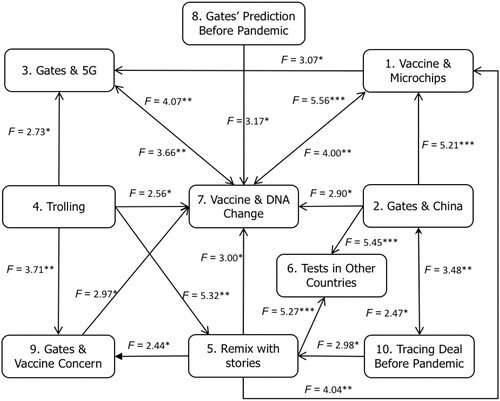This article has been reviewed according to Science X's editorial process and policies. Editors have highlighted the following attributes while ensuring the content's credibility:
fact-checked
peer-reviewed publication
trusted source
proofread
Study analyzes Twitter conspiracy theories during the pandemic involving Bill Gates

The COVID-19 pandemic was fertile ground for conspiracy theories and misinformation on Twitter, and Bill Gates was a frequent target. A new study, which analyzes well-known conspiracy theories about the role of Bill Gates during the pandemic is published in Cyberpsychology, Behavior, and Social Networking.
K. Hazel Kwon, Ph.D., from the Walter Cronkite School of Journalism and Mass Communication, Arizona State University, and co-authors analyzed 313,088 tweets surrounding Bill Gates over a nine-month period in 2020.
The investigators define conspiracy theories as "explanatory narratives about the ultimate causes of significant social and political events, with claims of secret plots by powerful actors."
The findings showed that each conspiracy theory is not an isolated event; instead, they are highly dynamic and interwoven. "Most conspiracy theories that emerged in our dataset were complementary to one another," stated the investigators. "Such findings allude that individuals' beliefs in one conspiracy theory may reinforce another, which leads to more sharing behaviors in digital space."
"As bots begin to influence and invade the social media infodemic, yet unforeseen and new problems will occur. What is most concerning is the speed and rapid spread of bot use to unforeseen areas. We are just beginning to get a glimpse of issues and concerns that will result from this technology. Continued research and observation of this phenomenon is required. Only with increased scrutiny will we be able to develop effective and long-lasting multifactorial countermeasures," says Editor-in-Chief Brenda K. Wiederhold, Ph.D., MBA, BCB, BCN, Interactive Media Institute, San Diego, California and Virtual Reality Medical Center, La Jolla, California.
More information: Chun Shao et al, A Dynamic Analysis of Conspiratorial Narratives on Twitter During the Pandemic, Cyberpsychology, Behavior, and Social Networking (2023). DOI: 10.1089/cyber.2022.0218
Journal information: Cyberpsychology, Behavior, and Social Networking
Provided by Mary Ann Liebert, Inc





















